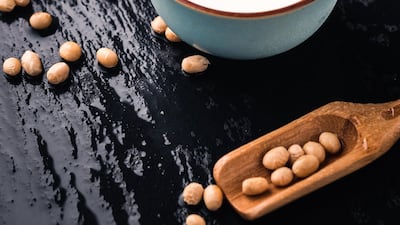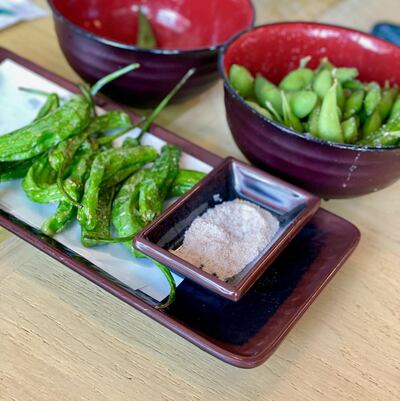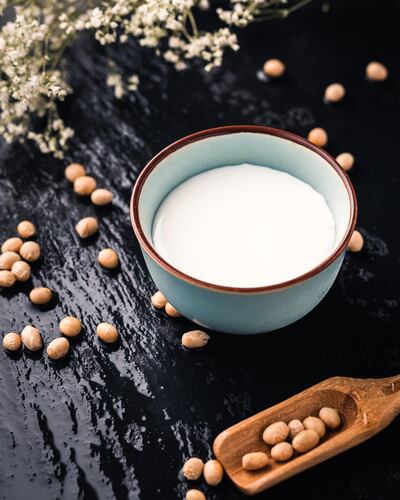It’s safe to say soya has a bad reputation. But, as with most nutrition-based rumours, this is a rather recent phenomenon.
After all, the ingredient has been consumed as part of many traditional Asian diets for centuries, and yet only became a staple in western lifestyles a few decades ago.
Since then, products derived from the humble plant-based protein have been put under a magnifying glass.
Where did it all come from?
It is all said to have started in the 1990s, when the soya bean, a nutrient-packed species of legume native to East Asia, was beginning to be popularised around the world as a health food, with the ability to fight the likes of heart disease, obesity and cancer. This was because people in Asian populations had significantly lower incidences of these diseases than those in the US.
The controversial little soya bean has quite an unfounded reputation, despite there being no airtight evidence to support or discredit its nutritional value to date
Then researchers started digging, and studies found soya to contain isoflavones, which have oestrogenic properties, and have been said to promote the growth of some cancer cells, particularly breast cancer, as well as impair female fertility and thyroid function.
In one 1999 study, for example, researchers implanted human breast cancer cells into mice, which were then fed isoflavones, and they found these to enhance tumour growth.
But then there were other studies, which discovered soya consumption could actually reduce the risk of some cancers, such as the gastrointestinal kinds, as well as help women deal with menopause symptoms and lower high cholesterol levels.
In 2010, a review of more than 100 studies showed that such experiments didn’t actually show a significant increased risk of breast cancers at all, which is the one disease soya is most commonly linked to in mainstream media today.
So what is the truth?
With all these conflicting studies, you can begin to see how soya products have become the subject of mass dietary confusion. So what’s the answer? Should we ditch soya altogether?
As with most things in the world of nutrition, the solution is not that simple.
“The controversial little soya bean has quite an unfounded reputation, despite there being no airtight evidence to support or discredit its nutritional value to date,” says Jo Owen, a holistic health and nutrition coach in Dubai, and founder of Nourish, Flourish and Fly.
She cites the breast cancer debate, but adds that soya-based food sources are not consumed in large enough amounts to cause the disease, and says they may in fact prevent it in some cases.
“But not all soya is created equally and it depends on the amount of processing that has taken place. For example, highly processed items [she calls them ‘Frankenfoods’] to avoid would be soya cheeses, yoghurt, cereals, protein bars and imitation meats.”
On the other hand, she says, the more organic, traditional, fermented forms, such as miso and tempeh, plus less processed soya milk, edamame and tofu, are better, healthier choices.
Avoid genetically modified products at all costs, she adds.
Rauan Alashkar, a dietician at Medcare Hospital in Dubai, agrees with this. “Avoid highly processed grocery products,” she advises. This includes those containing soya protein isolates, which are found in cereals, protein bars and other snacks. “[They] may contain more soya isoflavones.”
Foods she encourages people to eat in moderation are edamame, soya milk, tofu, miso and soya nuts. These have been found to actually have health benefits, she says. “Soya consumption may slightly reduce risk for gastrointestinal cancers and have protective effects in prostates. Also, soya could help lower levels of bad cholesterol.”
Owen says the fermented products also contain probiotics, which can contribute to a healthy and balanced microbiome.
That's not forgetting that soya is also packed with protein, unsaturated fats, fibre, plus a number of great vitamins, minerals and plant sterols.
There are much worse foods we could be eating, says Owen. This includes “any highly processed foods that are low in nutrient density and contain preservatives, unhealthy fats, sodium and added sugar,” she says. “But these can be soya, too, so choose carefully.”
Alashkar names sugary drinks, sweetened cereals, fried foods and potato chips.
“If you are looking to reduce your saturated fat intake and up your fibre intake, plant foods as a whole would be better for your heart,” adds Owen.
Who should avoid soya?
There are, however, certain people who should avoid soya products altogether – namely anyone who has been diagnosed with oestrogen receptor-positive breast cancer or has thyroid issues, says Alashkar.
Owen adds: “Anyone with a soya allergy and hypothyroid people with low iodine. Iodine levels can be increased by consuming sea veggies, seafood, grains, dairy and iodised salt.”
So why is that?
One of the reasons people can’t agree on soya, is because of the way we individually react to isoflavone. This either acts like an oestrogen in the body – or it doesn’t. In other words, the chemical compound either binds to the alpha oestrogen receptor in our bodies, which therefore increases a tumour’s growth rate, or it latches on to the beta receptor, which has the complete opposite effect.
Overall, it is said to actually prefer linking to beta receptors, thus more likely reducing potential cancer risk.
Some studies have shown it could make a difference as to when you started eating soya, too. For instance, generally speaking, people in Asia start consuming the foodstuff in the womb, while more commonly in the West they often won’t have tried it until later in life.
Other research, which focused on the impacts soya can have on menopause symptoms, also link the benefits to a woman’s ability to produce equol, a bacteria produced in the intestines after eating the ingredient.
The other thing to remember is that some – perhaps even all – of these health benefits might not be directly linked to the consumption of soya per se, but might have more to do with the fact that people who eat more soya are often more likely to have a diet lower in unhealthier foods overall.
Soya-based products, which are mostly low in saturated fat, usually replace foods that are higher in the bad fats, such as meat and dairy. So any reduced health risks could be linked to their generally healthier lifestyle choices.
What’s our verdict?
“You can go ahead and eat soy daily and feel good about it,” says Alashkar. “Just be sure that you are consuming an appropriate amount of lesser processed soy foods.”
Owen’s views on the matter are similar. “As with anything, don’t go overboard, but I would happily consume organic, traditional forms of soy as an alternative to processed animal protein two or three times a week,” she says.
“Soy is a nutrient-dense source of complete plant protein that is neither as amazing or bad for you as stated all over the internet.”
Now go and enjoy that soy latte in peace.
Countries recognising Palestine
France, UK, Canada, Australia, Portugal, Belgium, Malta, Luxembourg, San Marino and Andorra
UAE currency: the story behind the money in your pockets
UPI facts
More than 2.2 million Indian tourists arrived in UAE in 2023
More than 3.5 million Indians reside in UAE
Indian tourists can make purchases in UAE using rupee accounts in India through QR-code-based UPI real-time payment systems
Indian residents in UAE can use their non-resident NRO and NRE accounts held in Indian banks linked to a UAE mobile number for UPI transactions
What can victims do?
Always use only regulated platforms
Stop all transactions and communication on suspicion
Save all evidence (screenshots, chat logs, transaction IDs)
Report to local authorities
Warn others to prevent further harm
Courtesy: Crystal Intelligence
SPEC%20SHEET%3A%20APPLE%20M3%20MACBOOK%20AIR%20(13%22)
%3Cp%3E%3Cstrong%3EProcessor%3A%3C%2Fstrong%3E%20Apple%20M3%2C%208-core%20CPU%2C%20up%20to%2010-core%20CPU%2C%2016-core%20Neural%20Engine%3C%2Fp%3E%0A%3Cp%3E%3Cstrong%3EDisplay%3A%3C%2Fstrong%3E%2013.6-inch%20Liquid%20Retina%2C%202560%20x%201664%2C%20224ppi%2C%20500%20nits%2C%20True%20Tone%2C%20wide%20colour%3C%2Fp%3E%0A%3Cp%3E%3Cstrong%3EMemory%3A%3C%2Fstrong%3E%208%2F16%2F24GB%3C%2Fp%3E%0A%3Cp%3E%3Cstrong%3EStorage%3A%3C%2Fstrong%3E%20256%2F512GB%20%2F%201%2F2TB%3C%2Fp%3E%0A%3Cp%3E%3Cstrong%3EI%2FO%3A%3C%2Fstrong%3E%20Thunderbolt%203%2FUSB-4%20(2)%2C%203.5mm%20audio%2C%20Touch%20ID%3C%2Fp%3E%0A%3Cp%3E%3Cstrong%3EConnectivity%3A%3C%2Fstrong%3E%20Wi-Fi%206E%2C%20Bluetooth%205.3%3C%2Fp%3E%0A%3Cp%3E%3Cstrong%3EBattery%3A%3C%2Fstrong%3E%2052.6Wh%20lithium-polymer%2C%20up%20to%2018%20hours%2C%20MagSafe%20charging%3C%2Fp%3E%0A%3Cp%3E%3Cstrong%3ECamera%3A%3C%2Fstrong%3E%201080p%20FaceTime%20HD%3C%2Fp%3E%0A%3Cp%3E%3Cstrong%3EVideo%3A%3C%2Fstrong%3E%20Support%20for%20Apple%20ProRes%2C%20HDR%20with%20Dolby%20Vision%2C%20HDR10%3C%2Fp%3E%0A%3Cp%3E%3Cstrong%3EAudio%3A%3C%2Fstrong%3E%204-speaker%20system%2C%20wide%20stereo%2C%20support%20for%20Dolby%20Atmos%2C%20Spatial%20Audio%20and%20dynamic%20head%20tracking%20(with%20AirPods)%3C%2Fp%3E%0A%3Cp%3E%3Cstrong%3EColours%3A%3C%2Fstrong%3E%20Midnight%2C%20silver%2C%20space%20grey%2C%20starlight%3C%2Fp%3E%0A%3Cp%3E%3Cstrong%3EIn%20the%20box%3A%3C%2Fstrong%3E%20MacBook%20Air%2C%2030W%2F35W%20dual-port%2F70w%20power%20adapter%2C%20USB-C-to-MagSafe%20cable%2C%202%20Apple%20stickers%3C%2Fp%3E%0A%3Cp%3E%3Cstrong%3EPrice%3A%3C%2Fstrong%3E%20From%20Dh4%2C599%3C%2Fp%3E%0A
ICC Women's T20 World Cup Asia Qualifier 2025, Thailand
UAE fixtures
May 9, v Malaysia
May 10, v Qatar
May 13, v Malaysia
May 15, v Qatar
May 18 and 19, semi-finals
May 20, final
Learn more about Qasr Al Hosn
In 2013, The National's History Project went beyond the walls to see what life was like living in Abu Dhabi's fabled fort:
Specs
Engine: 51.5kW electric motor
Range: 400km
Power: 134bhp
Torque: 175Nm
Price: From Dh98,800
Available: Now
Jetour T1 specs
Engine: 2-litre turbocharged
Power: 254hp
Torque: 390Nm
Price: From Dh126,000
Available: Now
Key facilities
- Olympic-size swimming pool with a split bulkhead for multi-use configurations, including water polo and 50m/25m training lanes
- Premier League-standard football pitch
- 400m Olympic running track
- NBA-spec basketball court with auditorium
- 600-seat auditorium
- Spaces for historical and cultural exploration
- An elevated football field that doubles as a helipad
- Specialist robotics and science laboratories
- AR and VR-enabled learning centres
- Disruption Lab and Research Centre for developing entrepreneurial skills
MIDWAY
Produced: Lionsgate Films, Shanghai Ryui Entertainment, Street Light Entertainment
Directed: Roland Emmerich
Cast: Ed Skrein, Woody Harrelson, Dennis Quaid, Aaron Eckhart, Luke Evans, Nick Jonas, Mandy Moore, Darren Criss
Rating: 3.5/5 stars
CHATGPT%20ENTERPRISE%20FEATURES
%3Cp%3E%E2%80%A2%20Enterprise-grade%20security%20and%20privacy%3C%2Fp%3E%0A%3Cp%3E%E2%80%A2%20Unlimited%20higher-speed%20GPT-4%20access%20with%20no%20caps%3C%2Fp%3E%0A%3Cp%3E%E2%80%A2%20Longer%20context%20windows%20for%20processing%20longer%20inputs%3C%2Fp%3E%0A%3Cp%3E%E2%80%A2%20Advanced%20data%20analysis%20capabilities%3C%2Fp%3E%0A%3Cp%3E%E2%80%A2%20Customisation%20options%3C%2Fp%3E%0A%3Cp%3E%E2%80%A2%20Shareable%20chat%20templates%20that%20companies%20can%20use%20to%20collaborate%20and%20build%20common%20workflows%3C%2Fp%3E%0A%3Cp%3E%E2%80%A2%20Analytics%20dashboard%20for%20usage%20insights%3C%2Fp%3E%0A%3Cp%3E%E2%80%A2%20Free%20credits%20to%20use%20OpenAI%20APIs%20to%20extend%20OpenAI%20into%20a%20fully-custom%20solution%20for%20enterprises%3C%2Fp%3E%0A
From Europe to the Middle East, economic success brings wealth - and lifestyle diseases
A rise in obesity figures and the need for more public spending is a familiar trend in the developing world as western lifestyles are adopted.
One in five deaths around the world is now caused by bad diet, with obesity the fastest growing global risk. A high body mass index is also the top cause of metabolic diseases relating to death and disability in Kuwait, Qatar and Oman – and second on the list in Bahrain.
In Britain, heart disease, lung cancer and Alzheimer’s remain among the leading causes of death, and people there are spending more time suffering from health problems.
The UK is expected to spend $421.4 billion on healthcare by 2040, up from $239.3 billion in 2014.
And development assistance for health is talking about the financial aid given to governments to support social, environmental development of developing countries.
Company Profile:
Name: The Protein Bakeshop
Date of start: 2013
Founders: Rashi Chowdhary and Saad Umerani
Based: Dubai
Size, number of employees: 12
Funding/investors: $400,000 (2018)
UAE currency: the story behind the money in your pockets
Volunteers offer workers a lifeline
Community volunteers have swung into action delivering food packages and toiletries to the men.
When provisions are distributed, the men line up in long queues for packets of rice, flour, sugar, salt, pulses, milk, biscuits, shaving kits, soap and telecom cards.
Volunteers from St Mary’s Catholic Church said some workers came to the church to pray for their families and ask for assistance.
Boxes packed with essential food items were distributed to workers in the Dubai Investments Park and Ras Al Khaimah camps last week. Workers at the Sonapur camp asked for Dh1,600 towards their gas bill.
“Especially in this year of tolerance we consider ourselves privileged to be able to lend a helping hand to our needy brothers in the Actco camp," Father Lennie Connully, parish priest of St Mary’s.
Workers spoke of their helplessness, seeing children’s marriages cancelled because of lack of money going home. Others told of their misery of being unable to return home when a parent died.
“More than daily food, they are worried about not sending money home for their family,” said Kusum Dutta, a volunteer who works with the Indian consulate.
The%20specs%3A%202024%20Mercedes%20E200
%3Cp%3E%3Cstrong%3EEngine%3A%20%3C%2Fstrong%3E2.0-litre%20four-cyl%20turbo%20%2B%20mild%20hybrid%0D%3Cbr%3E%3Cstrong%3EPower%3A%20%3C%2Fstrong%3E204hp%20at%205%2C800rpm%20%2B23hp%20hybrid%20boost%0D%3Cbr%3E%3Cstrong%3ETorque%3A%20%3C%2Fstrong%3E320Nm%20at%201%2C800rpm%20%2B205Nm%20hybrid%20boost%0D%3Cbr%3E%3Cstrong%3ETransmission%3A%20%3C%2Fstrong%3E9-speed%20auto%0D%3Cbr%3E%3Cstrong%3EFuel%20consumption%3A%20%3C%2Fstrong%3E7.3L%2F100km%0D%3Cbr%3E%3Cstrong%3EOn%20sale%3A%20%3C%2Fstrong%3ENovember%2FDecember%0D%3Cbr%3E%3Cstrong%3EPrice%3A%20%3C%2Fstrong%3EFrom%20Dh205%2C000%20(estimate)%3C%2Fp%3E%0A
The%20specs
%3Cp%3E%3Cstrong%3EEngine%3A%3C%2Fstrong%3E%20Dual%20synchronous%20electric%20motors%0D%3Cbr%3E%3Cstrong%3EPower%3A%20%3C%2Fstrong%3E660hp%0D%3Cbr%3E%3Cstrong%3ETorque%3A%20%3C%2Fstrong%3E1%2C100Nm%0D%3Cbr%3E%3Cstrong%3ETransmission%3A%20%3C%2Fstrong%3ESingle-speed%20automatic%0D%3Cbr%3E%3Cstrong%3ETouring%20range%3A%20%3C%2Fstrong%3E488km-560km%0D%3Cbr%3E%3Cstrong%3EPrice%3A%20%3C%2Fstrong%3EFrom%20Dh850%2C000%20(estimate)%0D%3Cbr%3E%3Cstrong%3EOn%20sale%3A%20%3C%2Fstrong%3EOctober%3C%2Fp%3E%0A
The specs
Engine: 0.8-litre four cylinder
Power: 70bhp
Torque: 66Nm
Transmission: four-speed manual
Price: $1,075 new in 1967, now valued at $40,000
On sale: Models from 1966 to 1970
A%20Little%20to%20the%20Left
%3Cp%3E%3Cstrong%3EDeveloper%3A%20%3C%2Fstrong%3EMax%20Inferno%3Cbr%3E%3Cstrong%3EConsoles%3A%3C%2Fstrong%3E%20PC%2C%20Mac%2C%20Nintendo%20Switch%3Cbr%3E%3Cstrong%3ERating%3A%20%3C%2Fstrong%3E4%2F5%26nbsp%3B%3C%2Fp%3E%0A








